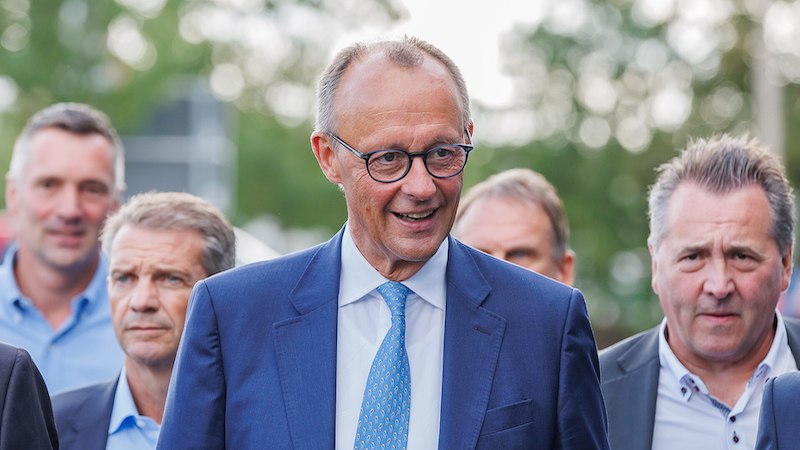Friedrich Merz took office as Chancellor of Germany in May 2025 at a moment that marked a decisive point for the five-century-old Germany-Indonesia partnership, which gained official status in 1952. The alliance rests on three fundamental pillars, which include economic partnerships and active academic collaborations as well as coordinated environmental initiatives.
The relationship between Germany and Indonesia faces challenges because Chancellor Merz follows inward economic and security policies and Indonesia seeks new positions in the Indo-Pacific area. This research argues that Germany needs to implement specific policy changes, such as expanding its budget flexibility and strengthening diplomatic relations, and protecting cooperative ties from internal political instabilities to prevent stagnation during this critical time for both nations.
The economic connection between Germany and Indonesia serves as the foundation of their bilateral relations through 2024 and into 2025, as seen in the USD 4.79 billion Indonesian exports to Germany and USD 3.12 billion German exports to Indonesia in 2024, which include footwear alongside electronics, machinery, vehicles, and chemicals. The 2023 trade data shows Indonesia bought USD 4.65 billion worth of German machinery and automotive parts, and precision equipment, yet exported ores, electrical equipment, and automotive components worth USD 2.52 billion to Germany. The trade statistics demonstrate a solid framework which enables German companies including Siemens and Bosch and BASF to operate in Indonesia since the mid-19th century and develop new projects in energy and infrastructure and digital fields during the early months of 2025. Through scholarship programs since 2020, more than 400,000 Indonesians have enrolled in German universities, which enables them to access Germany’s advanced research network, thus supporting Indonesia’s knowledge-based economic development.
Germany has changed its policy direction under Chancellor Merz’s leadership to emphasize Atlanticist security measures together with budgetary restraint. In March 2025, Merz gained parliamentary support to abolish the constitutional “debt brake” that capped annual deficits at 0.35 percent of GDP in order to fund defense and infrastructure modernization projects with €500 billion. The strategic decision to bolster Germany’s military capabilities alongside domestic connectivity comes with a price because it reduces funds available for Indonesian development programs focused on renewable energy and climate resilience. The support from only 3 coalition members during the first confidence vote places Merz in an unstable parliamentary position, which threatens his ability to pursue substantial international commitments, including concessional Indonesian geothermal funding and rainforest preservation technical support.
The development of stronger cooperation faces actual barriers due to regulatory and mobility challenges. During his election campaign, Merz advocated for strict border control measures to limit undocumented immigration, thus creating uncertainty among Indonesia’s student and skilled professional population. The German immigration restrictions have created doubt among prospective students and skilled professionals, which threatens to disrupt the exchange programs that provide both high-skilled workers for German industry and digital economy growth in Indonesia. The 2020 Indonesian nickel ore export ban serves to boost domestic processing, yet this measure opposes Germany’s increasing need for essential minerals needed to make electric vehicle batteries. The 2.03 million metric tons of nickel Indonesia produced in 2023, together with USD 8.6 billion in early 2025 downstream exports, demonstrate Indonesia’s fundamental position in worldwide clean energy supply networks, although declining nickel prices and production reduction talks are expected to increase trade tensions between the two nations.
Merz focuses on building a conventional army to stop Russian aggression, which aligns with European security needs, yet this initiative ignores maritime and digital elements crucial for Indonesia’s Indo-Pacific strategy. Since May 2025, there have been no official chancellor visits to Jakarta, and defense industry discussions remain scarce, which has generated doubts about German support for Indonesian defense requirements. Germany’s westward strategic orientation threatens to leave Indonesia with unfulfilled requirements for maritime surveillance and critical infrastructure protection, and cyber defense, because the country maintains its military strength against European threats.
The partnership faces numerous obstacles, yet it remains strong because both countries aim to reach net-zero emissions by the middle of the century. The combination of German precision engineering capabilities and Indonesian renewable resources enables the development of hydrogen technology and smart grids, and circular economies. The upcoming G20 presidency in the United States in 2026 will unite the EU-ASEAN climate and digital governance frameworks, which will strengthen bilateral coordination within a coalition for sustainable development. The partnership will drive major investments together with technological exchanges and harmonized policies that will strengthen economic ties and diplomatic relations between the two nations.
The Merz administration should focus on three strategic goals to maximize available opportunities. The German government should broaden its debt-brake exemptions to support joint climate and infrastructure projects in Indonesia while ensuring sustainable development remains free from geopolitical interference. The two governments need to create a high-level strategic dialogue that merges Indo-Pacific security requirements with Europe’s defense strategy to enable joint assessments and exercises and capacity-building programs for archipelagic areas. The economic cooperation must maintain its distance from domestic political changes through efficient skill partnership systems that combine digital visas with bilateral accreditation agreements and joint training facilities to guarantee essential talent movements for both nations’ industrial and technological progress.
At this critical moment, Indonesia and Germany must use adaptive policies to restore their historical connection by going beyond partisan differences and short-sighted geopolitical approaches. The Merz administration should integrate Indo-Pacific considerations with climate goals into its fiscal and strategic planning to turn potential stagnation into deep, multifaceted collaboration without harming Indonesia’s development and security objectives. This approach will prove that Indonesia stands as a fundamental element of Germany’s global diversification strategy while maintaining a partnership that has survived five centuries and creating new opportunities for mutual success.
The opinions expressed in this article are the author’s own.
References
Demes, D. (2025). Germany’s political shift rightwards: Implications for Berlin’s Indo-Pacific strategy. Prospects & Perspectives, (16), March 8, 2025.
The Diplomat. (2025, April 18). The Indo-Pacific region in the agenda of Germany’s coalition government. The Diplomat.
Sandhu, J. (2025, June 2). Seize the India–Germany moment. India’s World.
